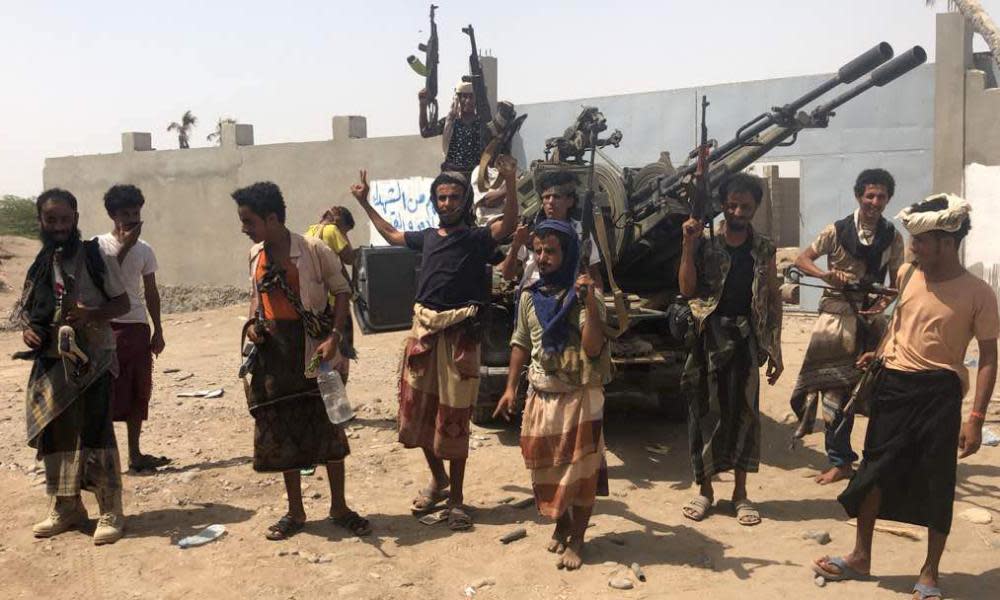Saudi-backed Yemeni forces capture Hodeidah airport

Saudi-backed Yemeni government forces have captured the airport at Hodeidah and have started preparations for the more complex task of capturing the city and its port nine miles (15km) to the north. The port is critical to the supply of aid to the rest of the famine-struck country.
Confirmation that the airport on the southern outskirts of the city had been seized after three days of fighting came from both TV pictures and eyewitness accounts. At least 40 Houthi fighters who had held the airport were killed, but most retreated into the city, preparing to fight a potentially intense street-by-street campaign that could endanger tens of thousands of civilians.
The military advance came after the UN special envoy for Syria, Martin Griffiths, left the Yemeni capital, Sana’a, after failing to broker a ceasefire that would have seen the port taken under UN control. Griffiths provided a closed-door briefing to the UN security council by satellite link on Monday, but departed Sana’a without speaking to the press.
The security council has been divided over whether to demand a ceasefire, and Russia, its current chair, gave a downbeat assessment of the chances for a diplomatic breakthrough after the meeting. Most western states oppose the Iranian-backed Houthi takeover of Yemen, but also assert a military solution to the civil war is not possible.
Griffiths has expressed concern that a prolonged battle for the port could endanger aid supplies for the entire country. Hodeidah port acts as the distribution point for nearly 80% of the aid going across Yemen.
The Saudi and UAE forces that are providing military support to the campaign by the Yemeni government led by Abdrabbuh Mansur Hadi to win back control of the port insisted Houthi surrender had to be unconditional, rejecting proposals that the rebels remain in the city, but the port could be placed under UN control. The port is currently functioning.
The UAE insists it has elaborate contingency aid plans in place if the battle for the port is either prolonged or leads to damage to its infrastructure, so interrupting the supply of food, water and fuel.
But the International Rescue Committee said these assurances were little but “a publicity stunt meant to draw attention away from the undue suffering the attack is causing”.
Amanda Catanzano, the aid agency’s policy director said: “The so-called relief plan announced by the Arab coalition in Yemen must be seen for exactly what it is; a justification to launch an attack that will have catastrophic consequences. The modalities for the delivery of this plan are vague, and the plan alone will not address the underlying causes of conflict in Hodeidah, nor the level of humanitarian need that will be created by a siege or attack on the port and the city itself.
“Nobody following this war for the past three plus years can believe that the Saudi coalition has any intention of prioritising the wellbeing of Yemeni civilians. The Hadi government, backed by this coalition, has been in control in Aden and other areas in southern Yemen for three years, yet, innocent Yemeni civilians living in these areas continue to suffer from a total lack of basic healthcare and critical life-saving services.”
According to the International Organisation for Migration, 76,000 people have been displaced across the 13 districts of the Hodeidah governorate since the Saudi-led advance began. The numbers that have left the city itself is put as low as 6,000, but many exit routes have been blocked.

 Yahoo News
Yahoo News 
